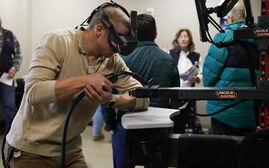Five Maine mill towns share $1M forest products innovation grant
Five communities in Somerset, Aroostook and Penobscot counties that have been hit by timber mill shutdowns in the last several years will share more than $1 million from groups working to diversify and develop the state's wood products industry.
The FOR/Maine coalition and Maine Development Foundation this week announced the grants, which are designed to attract capital investments and develop economic prosperity for rural communities. The five awardees were announced after a process aimed at identifying new opportunities that will have an impact on economic revitalization and the next generation of forest products, a news release announcing the grants said.
Grant recipients
Ashland, where the ReEnergy biomass plant shut down last year, will get $150,000 to develop a Structural Round Timber market that will serve the East Coast. The town and surrounding communities in southern Aroostook county recently formed the Ashland Area Economic Development Corp. to expand jobs, recreation and business development in the region.
East Millinocket, where the Great Northern Paper mill closed in 2013, will get $210,000 to stabilize the former Great Northern Paper mill campus, including repairing several structures to make them available for long-term lease for forest-products businesses. A year ago, the Penobscot County town and the University of Maine were awarded a $1.25 million Northern Borders Regional Commission grant that allowed the town to buy the site, where UMaine will develop a demonstration-scale nanocellulose plant.
Lincoln, where the Lincoln Pulp and Paper mill closed in 2015, will get $185,000 to redevelop the Lincoln Paper & Tissue mill site through feasibility assessment and planning related to building rehabilitation, upgrading essential infrastructure and restoring waste water treatment. The town last fall announced the mill site will be developed into the Maine Forest Products Innovation Park, with cross laminated timber company Ligna Terra as its anchor tenant.
Madison, where the mill closed in 2016, will get $400,000 to redevelop the Somerset County site through demolition of the special chemicals building and boiler house for a new use of the site by GO Labs. GO Labs bought the mill last year and by next year plans to be manufacturing wood fiber insulation products there.
Millinocket, where the mill closed in 2008, will get $216,090 for energizing the substation on the brownfield portion of the Great Northern Paper site, where potential tenants are ready to locate contingent on the upgrades. The effort to redevelop the Penobscot County mill site has been going on since the nonprofit Our Katahdin bought it in 2018.
In all five towns, deep in the state's "timber basket," the money will be used for redevelopment projects that are considered catalysts "for the next generation of forest economy products, especially during this critical transition in global markets," the release said.
Positive step, coordinated effort
The grants are primarily funded by the Northern Border Regional Commission and the Maine Rural Development Authority. They will be administered by Maine Development Foundation, which staffs the FOR/Maine coalition and is a key partner in the coalition’s work.
“This is an extremely positive step forward both to provide critical funding to these communities, but also because this funding was developed by a coordinated and concerted effort that focused on regional needs rather than just one group or community,” said Charlie Spies, CEO of CEI Capital and FOR/Maine communities subcommittee chair.
“The need was apparent as one mill after another shut down over the last decade, leaving these century-old, forest-based economies anchorless. The recent appearance of the COVID-19 pandemic only exacerbates the need. It is a model for future work that can be replicated to continue transitioning these economies to make them more diverse and sustainable.”
Madison Town Manager Tim Curtis said that the money will be a big boost to the already underway effort by GO Lab to redevelop the former Madison Paper site.
"Madison is fortunate to be in a partnership with GO Lab," he said. "We are deeply grateful for the tireless efforts of MDF to assist municipalities hit hardest by the closure of paper mills over the past several years. MDF’s collaboration with the Northern Border Regional Commission and the Maine Rural Development Authority has resulted in direct funding to help former mill towns rebuild."
Northern Borders Executive Director Rich Grogan said it's exciting to see the money go to projects that support innovative efforts to diversify Maine’s forest economy communities. “It is also crucial that these investments support new forest economy products, furthering this industry’s rich tradition in Maine, and across the NBRC region," he said.
Part of a bigger program
The awards are part of the Increasing Prosperity for Maine’s Forest Economy Communities subgrant program, which is funded by the Northern Border Regional Commission, Maine Rural Development Authority, and with additional matching money from the U.S. Economic Development Administration, the Maine Department of Economic and Community Development and FOR/Maine.
The members of Maine’s congressional delegation have also been instrumental in advocating for the increased targeted funding for the regional Forest Economy program at NBRC, as well as for the federal funding support to establish FOR/Maine in 2016 and begin implementing its recommended strategies, the release said.
In a joint statement, three members of Maine's congressional delegation, noting that the forest products industry has been a critical economic contributor to rural Maine communities for generations, said that it can continue to be with the right investments.
“The work of the industry-led FOR/ME initiative has helped position this sector for continued success, and these grants for Ashland, Millinocket, East Millinocket, Lincoln and Madison will build on its progress. Investments in these communities will bolster the development of new sustainable forest products, help support good quality jobs in each region, and take important steps toward our shared goal of revitalizing Maine’s forest economy," said U.S. Sen. Susan Collins, R-Maine, U.S. Sen. Angus King, I-Maine, and Rep. Jared Golden, D-Maine 2nd District. The mill sites are all in Golden's district.














0 Comments